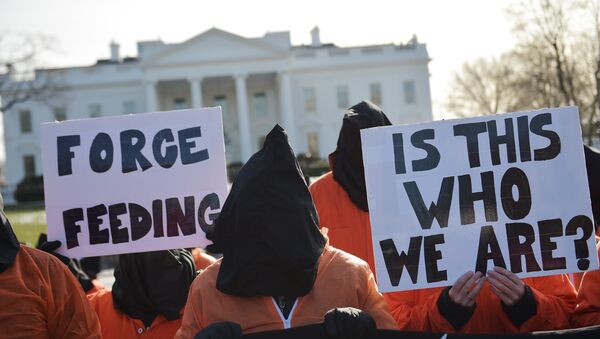During a public veto ceremony last month, President Obama outlined why he was impeding legislation aimed at preserving the controversial detention center known as Gitmo.
"Guantanamo is one of the premier mechanisms for jihadists to recruit," he said. "It’s time for us to close it. It is outdated, it is expensive, it has been there for years, and we can do better in terms of keeping our people safe while ensuring we are consistent with our values."
To that end, the Pentagon is expected to unveil its plan later this week for closing the prison once and for all.
It’s a moment human rights activists have been calling for since the early days of the war on terror. Guantanamo detainees are often held without trial, subjected to inhuman treatment like forced feeding, and imprisoned long after they were no longer deemed a threat.
"Some of them were individuals who were picked up by the Northern Alliance, and we have no idea why they were there, and we didn’t know exactly what their connections were to terrorism," Sgt. Erik Saar, a soldier who spent three months interrogating prisoners at Gitmo, told CBS News in 2005.
"I think the harm we are doing there far outweighs the good, and I believe it’s inconsistent with American values."
Since the prison camp’s inception, at least seven detainees have died while incarcerated.
The closing of the detention center is undoubtedly good news. But the notorious policies which occur behind its walls may continue, as the Pentagon looks for alternative sites to house Gitmo inmates.
According to Reuters, a team of Defense Department officials surveyed a number of facilities in the continental United States as suitable locations to transfer detainees. At the top of the list is the Centennial Correctional Facility in Colorado, but there are a number of other possibilities. The Consolidated Naval Brig in South Carolina, Fort Leavenworth, Kansas, and the Federal Correctional Complex in Colorado are also possibilities.
Current detainees would reportedly be classified in one of three ways. Those who are able to be prosecuted will be put on trial. Those deemed eligible would be transferred to their home countries or other willing states. But those deemed “too dangerous to release” would be transferred to the alternative site.
Human rights activists have already been quick to point out the unconstitutionality of transferring prisoners to American soil without first granting them a fair trial.
Still, the plan faces strong opposition from Republican lawmakers, many of whom seem to fear the very idea of placing suspected terrorists in their home state.
"I will not sit idly by while the president uses political promises to imperil the people of Colorado by moving enemy combatants from Cuba, Guantanamo Bay, to my state of Colorado," Republican Senator Cory Gardner said during a news conference.
Others are frustrated that it’s taken this long for the president to present a plan.
"I’ve asked for six and a half years for this administration to come forward with a plan – a plan that we could implement in order to close Guantanamo," Arizona Senator John McCain told reporters earlier this week.
"They have never come forward with one and it would have to be approved by Congress."
Whatever Washington’s ultimate decision, President Obama should remember that his promise was less about shutting down a building, and more about upholding basic human dignity.





